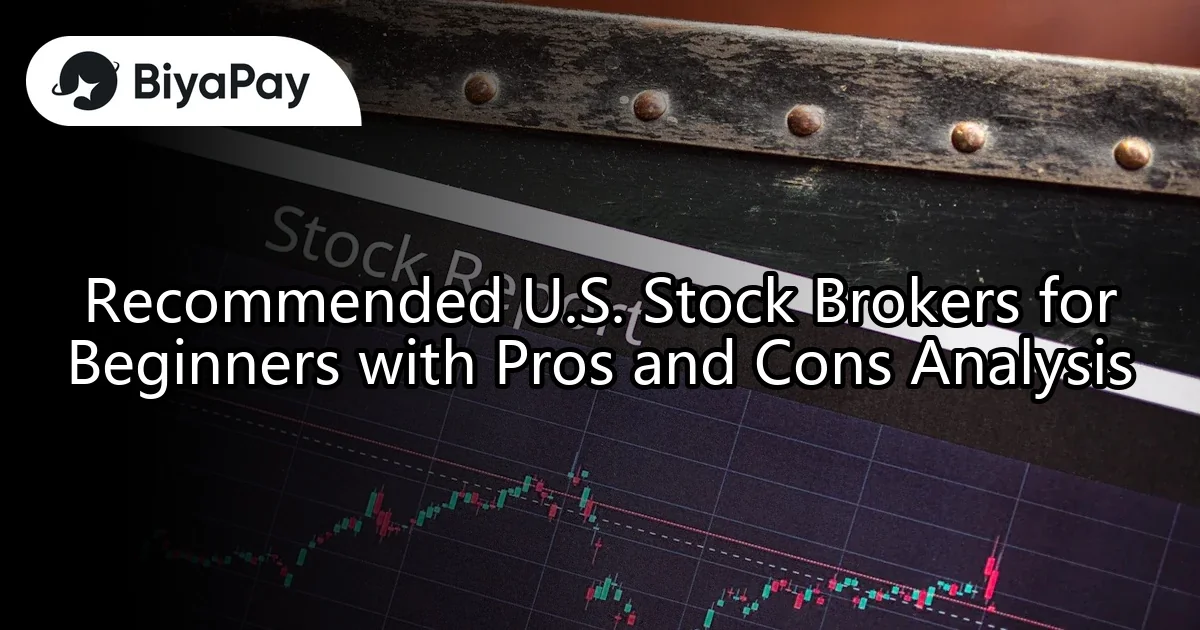- EasyCard
- Trade
- Help
- Announcement
- Academy
- SWIFT Code
- Iban Number
- Referral
- Customer Service
- Blog
- Creator
Recommended U.S. Stock Brokers for Beginners with Pros and Cons Analysis

Image Source: pexels
Choosing the right U.S. stock broker is a crucial first step in starting your journey in U.S. stock investing. For beginners, brokers like Robinhood, Webull, and TD Ameritrade offer user-friendly platforms. Meanwhile, Firstrade, Longbridge Securities, and Futu Securities are particularly popular due to their Chinese-language support. Selecting the right broker can make your investment journey much smoother.
Key Points
- Choosing a suitable U.S. stock broker is the first step in investing. Consider commissions, features, and services.
- Robinhood and Firstrade offer commission-free trading, ideal for beginners with limited funds. They are simple to use and easy to learn.
- TD Ameritrade and Charles Schwab provide extensive educational resources and support services, suitable for investors who want to learn more.
Recommended U.S. Stock Brokers for Beginner Investors

Image Source: unsplash
Robinhood
If you’re a young person just starting with U.S. stock investing, Robinhood might appeal to you. It is renowned for its zero-commission trading, and its interface is simple and intuitive, making it very beginner-friendly. The average age of Robinhood users is only 28 years old, with half being first-time investors, indicating its strong appeal to young investors. Additionally, its educational platform, Robinhood Learn, has seen a sixfold increase in page views, helping beginners learn investment knowledge. However, Robinhood’s features are relatively basic, suitable for users engaging in simple trading.
Webull
Webull is another great choice for beginners, especially for those who want to dive deeper into the market. It provides free real-time data and technical analysis tools, allowing you to access more professional resources during your U.S. stock investing entry phase. Webull also supports a paper trading feature, helping you practice investment skills in a risk-free environment.
TD Ameritrade
TD Ameritrade is known for its user-friendly interface and robust educational resources. Whether you’re a casual investor or have some experience, this platform can meet your needs. Its Thinkorswim trading platform is feature-rich but may feel complex for beginners. However, TD Ameritrade offers abundant learning materials to help you gradually master investment skills.
Charles Schwab
Charles Schwab is a comprehensive platform, ideal for investors who trade infrequently. Its low trading fees and excellent customer service provide reassurance for beginner investors. Additionally, Charles Schwab offers comprehensive evaluation tools to help you choose the most suitable trading strategies.
Firstrade
If you prefer using a Chinese interface, Firstrade is a good option. It offers a fully Chinese-language interface and Chinese customer support, with commission-free trading and no contract fees for options trading. For users just starting with U.S. stock investing, Firstrade’s intuitive interface and free Morningstar analysis tools are very user-friendly.
Longbridge Securities
Longbridge Securities focuses on serving Chinese investors, offering a Chinese interface and customer support. Its trading fees are low, making it suitable for beginners with smaller capital. Additionally, Longbridge Securities supports multiple payment methods, facilitating quick fund deposits.
Futu Securities
Futu Securities is known for its social investment platform. It not only provides Chinese-language services but also has an active investor community, allowing you to exchange experiences with other investors. Futu Securities’ interface is modern and feature-rich, suitable for beginners who want to gain a deeper understanding of the market.
Pros and Cons Analysis of Each Broker
Robinhood’s Pros and Cons
Robinhood is the preferred choice for many young investors, but it’s not perfect. Below are its pros and cons:
Pros:
- Zero-Commission Trading: Robinhood is known for commission-free trading, particularly suitable for investors with limited funds who are sensitive to fees.
- Simple and User-Friendly: The interface is intuitive, and the operation process is straightforward, ideal for users in the U.S. stock investing entry phase.
- Rich Educational Resources: The Robinhood Learn page helps beginners quickly grasp the basics of investing.
Cons:
- Hidden Fees: While it appears commission-free, the platform profits through “payment for order flow” (PFOF), which accounted for 80.5% of total revenue in Q1 2021.
- Limited Features: Suitable for simple trading but does not support advanced trading strategies.
- Platform Stability Issues: During periods of high market volatility, the system has experienced multiple outages, affecting user trading experiences.
Notably, among Robinhood’s user base, the number of female users is growing rapidly, and the proportion of Black and Hispanic investors is higher than the industry average. This indicates its success in attracting a diverse investor base.
Webull’s Pros and Cons
Webull provides more tools for investors who want to dive deeper into the market, but it has some drawbacks.
Pros:
- Free Market Data: Offers real-time data and technical analysis tools to help you better understand market dynamics.
- Paper Trading Feature: Beginners can practice investment skills in a risk-free environment.
- Commission-Free Trading: Like Robinhood, Webull also offers commission-free trading services.
Cons:
- Steeper Learning Curve: The platform’s rich features may feel complex for users with no investment experience.
- Lack of Chinese Support: For users accustomed to Chinese interfaces, the experience may not be as user-friendly.
TD Ameritrade’s Pros and Cons
TD Ameritrade attracts many investors with its robust educational resources and professional platform, but it has some limitations.
Pros:
- Rich Educational Resources: Offers extensive learning materials and video tutorials to help you gradually master investment skills.
- Thinkorswim Platform: Feature-rich, suitable for investors with some experience.
- Excellent Customer Service: Provides 24/7 support, resolving user issues promptly.
Cons:
- Higher Fees: While stock trading is commission-free, certain services may incur additional fees.
- Complex Platform: Thinkorswim may feel overly professional and difficult for beginners to navigate.
According to market surveys, users with higher investable assets tend to prefer TD Ameritrade due to its advisory services tailored for such groups.
Charles Schwab’s Pros and Cons
Charles Schwab is a comprehensive platform, ideal for long-term investors.
Pros:
- Low Fees: Trading fees are low, suitable for infrequent traders.
- Reliable Customer Service: Offers multiple support channels with high user satisfaction.
- Comprehensive Evaluation Tools: Helps you develop more scientific investment strategies.
Cons:
- Traditional Interface Design: Compared to other platforms, Charles Schwab’s interface feels less modern.
- Not Ideal for Short-Term Trading: The platform is better suited for long-term investors, and short-term traders may find its features lacking.
Firstrade’s Pros and Cons
Firstrade is popular among Chinese investors for its Chinese support and commission-free trading.
Pros:
- Chinese-Language Support: Offers a fully Chinese interface and customer support, eliminating language barriers.
- Commission-Free Trading: Stocks, ETFs, and options trading are commission-free, with no contract fees for options.
- User-Friendly: The interface is intuitive, suitable for users in the U.S. stock investing entry phase.
Cons:
- Delayed Market Data: Free users cannot access real-time market data.
- Limited Features: Does not support certain advanced trading strategies.
Longbridge Securities’ Pros and Cons
Longbridge Securities focuses on serving Chinese investors, offering many localized features.
Pros:
- Chinese Support: Both interface and customer service are in Chinese, aligning with the needs of Chinese users.
- Low Trading Fees: Suitable for beginners with smaller capital.
- Multiple Payment Methods: Supports various deposit methods, making fund transfers convenient.
Cons:
- Limited Market Coverage: Primarily focuses on the U.S. stock market, with less support for other markets.
- Basic Features: Not suitable for users needing complex trading tools.
Futu Securities’ Pros and Cons
Futu Securities attracts many beginner investors with its social investment platform and modern interface.
Pros:
- Social Features: An active investor community allows you to exchange experiences with others.
- Chinese-Language Support: Offers a Chinese interface and customer support for a user-friendly experience.
- Rich Features: Modern interface with support for various trading tools and analysis functions.
Cons:
- Higher Fees: While fees are transparent, they are slightly higher compared to other platforms.
- Suited for Short-Term Trading: More suitable for frequent traders, potentially less practical for long-term investors.
Futu Securities’ social features are particularly appealing to users who enjoy sharing investment experiences. If you value interaction during investing, this platform is worth trying.
Key Considerations for Choosing a U.S. Stock Broker

Image Source: pexels
Trading Fees and Commissions
When choosing a U.S. stock broker, trading fees are a key factor to consider. Fee structures can vary significantly between brokers, including commissions, account maintenance fees, and other hidden costs.
You should choose a broker based on your trading frequency and capital size. For users in the U.S. stock investing entry phase, commission-free platforms like Robinhood or Firstrade may be more suitable.
Platform Features and User Experience
A feature-rich and user-friendly platform can make your investment experience smoother. You can evaluate a broker’s features from the following aspects:
- Platform Stability: Does the platform crash during peak trading periods?
- Feature Completeness: Does it support real-time data, technical analysis tools, and paper trading?
- User Satisfaction: According to statistics, the SUPR-Q scale has an average score close to 4, and the UMUX scale ranges from 4.454 to 5.381, indicating high user satisfaction with features and experience.
For beginners, platforms like Webull, which offer paper trading, are highly practical, helping you get familiar with operations in a risk-free environment.
Customer Service Quality
When you encounter issues, can the broker’s customer service respond promptly? This is a critical factor. High-quality customer service includes:
- 24/7 support
- Multi-language support (e.g., Chinese)
- Multiple communication channels (phone, email, live chat)
TD Ameritrade and Charles Schwab excel in customer service, addressing user issues quickly.
Fund Security and Regulation
Ensuring the safety of your funds is fundamental to investing. Choosing a broker regulated by the U.S. Securities and Exchange Commission (SEC) and the Financial Industry Regulatory Authority (FINRA) can effectively reduce risks. Additionally, it’s important to check whether the broker offers investor protection plans, such as SIPC insurance.
Support for Chinese-Language Services
For Chinese investors, Chinese-language support significantly enhances the user experience. Firstrade, Longbridge Securities, and Futu Securities all provide Chinese interfaces and customer support, making it easier for you to start your U.S. stock investing journey.
Choosing the right U.S. stock broker is a critical first step in your investment journey. For beginners, Firstrade, Longbridge Securities, and Futu Securities are excellent options. They offer Chinese support, user-friendly interfaces, and a smoother experience. If you trade infrequently, Firstrade may be more suitable; Longbridge Securities is ideal for users with smaller capital; and Futu Securities is perfect for those who enjoy social investing. Based on your needs, select the most suitable broker and embark on your U.S. stock investment journey!
FAQ
1. What Documents Are Required to Open a U.S. Stock Broker Account?
Opening an account typically requires a passport, proof of identity, and proof of address. Some brokers may also require tax information (e.g., W-8BEN form) to comply with U.S. tax regulations.
2. How Soon Can I Start Trading After Opening an Account?
Most brokers allow trading immediately after account approval, which usually takes 1-3 business days. Some platforms support rapid account opening, completing the process within a few hours.
3. Is There a Minimum Funding Requirement for U.S. Stock Trading?
Many brokers have no minimum funding requirements, but certain account types (e.g., margin accounts) may require at least $2,000. Check the broker’s website for specific requirements.
Tip: Carefully review the broker’s funding requirements and fee disclosures before opening an account to avoid unnecessary issues.
4. How to Choose the Right U.S. Stock Broker for Me?
Choose a broker based on your needs. If you require Chinese support, Firstrade, Longbridge Securities, and Futu Securities are good options. Frequent traders may prefer feature-rich platforms.
Suggestion: Try the demo accounts of multiple brokers to experience their features before making a decision.
For new investors, selecting the right U.S. stockbroker is key to success. Robinhood and Webull offer commission-free trading, while Firstrade, Longbridge, and Futu provide Chinese-language support to ease your entry into markets like S&P 500 ETFs. BiyaPay enables you to invest in U.S. and Hong Kong stocks without an overseas account, simplifying global market access. The platform supports conversions across 30+ fiat currencies and 200+ cryptocurrencies, with remittance fees as low as 0.5%, spanning 190+ countries for fast fund transfers. Join BiyaPay now for secure, efficient investing. Licensed by U.S. MSB and SEC, BiyaPay ensures compliance, with real-time exchange rate tracking to optimize costs. Idle funds can grow via a 5.48% APY flexible savings product. Sign up with BiyaPay to start your U.S. stock investment journey today!
*This article is provided for general information purposes and does not constitute legal, tax or other professional advice from BiyaPay or its subsidiaries and its affiliates, and it is not intended as a substitute for obtaining advice from a financial advisor or any other professional.
We make no representations, warranties or warranties, express or implied, as to the accuracy, completeness or timeliness of the contents of this publication.




Contact Us
Company and Team
BiyaPay Products
Customer Services
BIYA GLOBAL LLC is a licensed entity registered with the U.S. Securities and Exchange Commission (SEC No.: 802-127417); a certified member of the Financial Industry Regulatory Authority (FINRA) (Central Registration Depository CRD No.: 325027); regulated by the Financial Industry Regulatory Authority (FINRA) and the U.S. Securities and Exchange Commission (SEC).
BIYA GLOBAL LLC is registered with the Financial Crimes Enforcement Network (FinCEN), an agency under the U.S. Department of the Treasury, as a Money Services Business (MSB), with registration number 31000218637349, and regulated by the Financial Crimes Enforcement Network (FinCEN).
BIYA GLOBAL LIMITED is a registered Financial Service Provider (FSP) in New Zealand, with registration number FSP1007221, and is also a registered member of the Financial Services Complaints Limited (FSCL), an independent dispute resolution scheme in New Zealand.




















